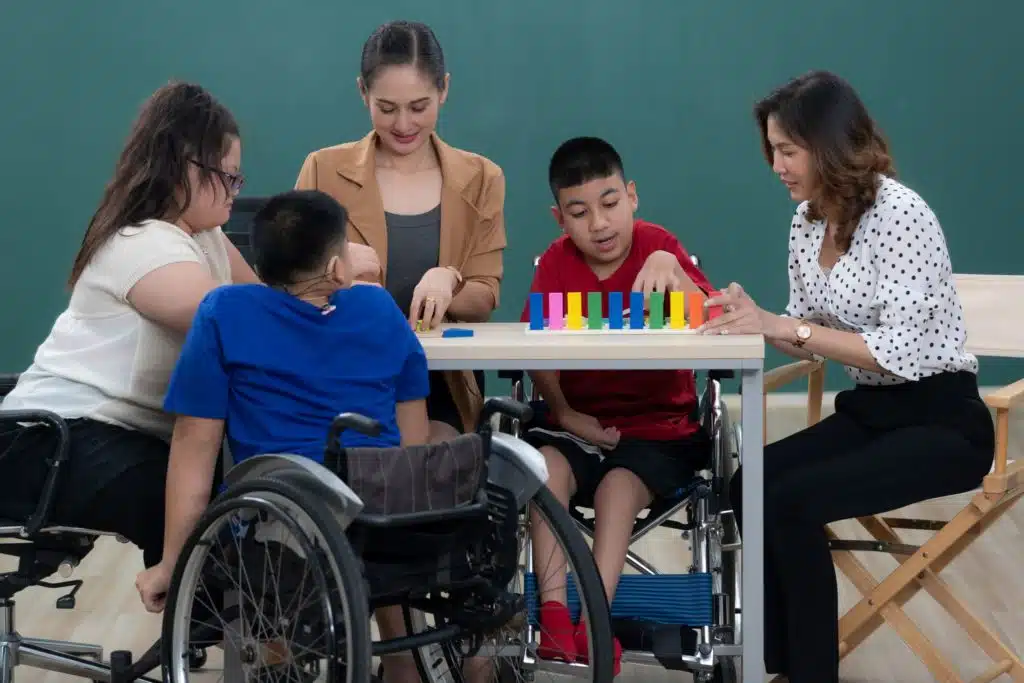Bachelor of Elementary Education in Special Needs Education
The Bachelor of Elementary Education in Special Needs Education is a comprehensive program designed to prepare educators to meet the unique needs of diverse learners in inclusive classrooms. This program equips future teachers with the knowledge, skills, and strategies necessary to support students with various disabilities and learning differences, ensuring all learners have access to a quality education.

Program Structure:
Foundations of Special Needs Education
-
- Introduction to Special Needs Education
- Child Development and Learning
- Inclusive Education Policies and Practices
- Educational Psychology
Gifted and Talented Education
-
- Understanding Gifted and Talented Learners
- Differentiated Instruction for Gifted and Talented Students
- Talent Identification and Development
- Strategies for Nurturing Gifted and Talented Potential
Curriculum and Pedagogy in Inclusive Education
-
- Curriculum Design and Adaptation
- Inclusive Pedagogical Strategies
- Technology in Inclusive Education
- Assessment and Individualized Education Plans (IEPs)
Semester 4: Supporting Learners with Sensory and Physical Disabilities
-
- Sensory Processing and Assistive Technologies
- Physical Disabilities and Accessibility
- Inclusive Physical Education
- Occupational Therapy in Education
Learners with Emotional and Behavioral Disabilities
-
- Behavior Management and Modification
- Understanding Emotional and Behavioral Disorders
- Positive Behavioral Interventions and Supports (PBIS)
- Trauma-Informed Teaching
Language and Communication Disabilities
-
- Speech and Language Development
- Augmentative and Alternative Communication (AAC)
- Effective Communication Strategies
- Assistive Technology for Communication
Educational Assessment of Students with Additional Needs
-
- Assessment Tools and Techniques
- Individualized Assessment and Evaluation
- Data-Driven Decision-Making
- Ethical Considerations in Assessment
Inclusive Adaptation in Mathematics and Science Instruction
-
- Inclusive Mathematics Instruction
- Inclusive Science Education
- Differentiating Math and Science Curricula
- STEM Education for All
Early Childhood Inclusive Education
-
- Inclusive Mathematics Instruction
- Inclusive Science Education
- Differentiating Math and Science Curricula
- STEM Education for All
Transition in Education
-
- Transition Planning for Students with Disabilities
- Vocational and Life Skills Training
- Collaboration with Transition Agencies
- Legal and Ethical Considerations
Teaching Multi-Grade Class
-
- Multi-Grade Classroom Management
- Curriculum Adaptation for Multi-Grade Settings
- Differentiated Instruction in Multi-Grade Classes
- Assessment and Progress Monitoring
Effective Courses:
-
- Adapted Physical Education and Recreation
- Music and Health in Special Needs Education
Practical Experience:
Throughout the program, students will engage in practicum experiences in diverse educational settings, including mainstream classrooms, special education programs, and community organizations.

These experiences will provide students with the opportunity to apply their knowledge and skills in real-world situations.
Upon completion of the Bachelor of Elementary Education in Special Needs Education program, graduates will be well-prepared to make a positive impact on the lives of diverse learners and contribute to the creation of inclusive and equitable educational environments. They will have the skills to address the unique needs of students with disabilities and learning differences, promoting their academic and personal growth.

